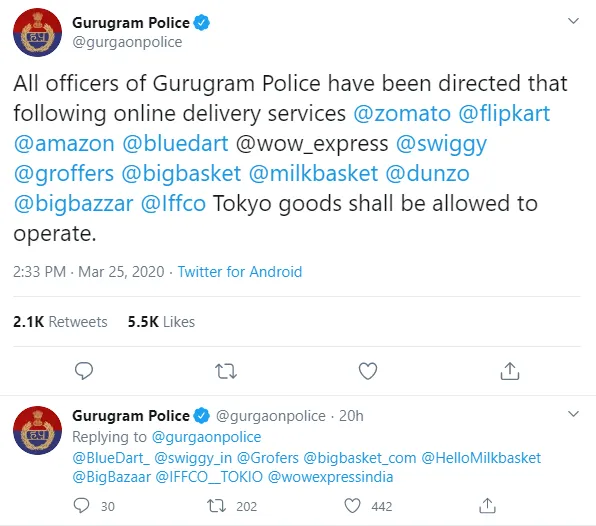Coronavirus: The effect of the global pandemic on India’s ecommerce industry
As the world reels under the effect of the coronavirus pandemic, India is under a countrywide lockdown. Here’s how the ecommerce industry is faring.

Note: The facts in this article are accurate at the time of writing. Since the situation is uncertain and constantly changing, the ground realities may be different by the time you read this.
“WFH sucks.”
That is the unabashed opinion of Sachin Bansal, Co-founder of – India’s equivalent of Amazon – about the new work from home routine gripping every workplace – from startups to enterprises in light of the coronavirus pandemic.
On March 19, 2020, Prime Minister Narendra Modi addressed the nation and urged people to remain home on March 22 in a Janata (self-imposed) curfew. Then, on March 24 – barely five days later – the government imposed a countrywide lockdown to mitigate the further spread of the virus.
Earlier, as part of a series of stringent measures to fight the virus, the Indian government had already imposed a ban on all international flights to and from the country. To add to that, all state borders have also been completely sealed as of now, barring transport of essential goods.
So what does this mean for online businesses and the $64 billion ecommerce industry in India?
Revenues go zig zag
Daniel Zhang, CEO of , reportedly warned of a decrease in revenue from operations in China where coronavirus continues to adversely impact supplies, logistics, and deliveries.
However, the Indian ecommerce industry presents a picture in contrast – people are switching from malls and supermarkets to ecommerce for purchase of everyday commodities, resulting in drastic spikes in online orders for companies such as Flipkart, , , and .
“We have seen a very clear uptick in terms of orders, which have grown by 20-30 percent compared to last month, and it is picking up pace as more people decide to order online,” said Vipul Parekh, Co-founder of Bigbasket, one of the two major players in the food and grocery niche, in an interview.
There is cause for concern, however, with Amazon and Flipkart suspending all new orders and deliveries after the lockdown.
Even earlier in March, fashion brands had already taken a hit online just like they did offline. While apparel retailers have seen declines of up to 60 percent in their brick-and-mortar sales, revenues have gone down about 15 percent online too.
A media report claimed that the CEO of one fashion house declared, “The sentiments are so poor, who will buy in fashion category? When people are worried about salary and job cuts, discretionary shopping is logical to fall.”
Travel and leisure
Perhaps the biggest economic loser in India would be the travel and tourism industry. The country’s biggest ecommerce company in terms of revenue isn’t Amazon or Flipkart.
It is the Indian Railway Catering and Tourism Corporation (IRCTC), which handles ticketing for the Indian Railways. Nearly 300 million tickets are booked every year through the platform.
The whole value chain comprising taxi drivers, small-time travel agents, tour operators, hotels, and online travel aggregators (OTAs) has been badly hit. The major OTAs and Yatra have seen their stock prices decline 50 percent over the past month.
While the government stopped issuing visas to foreign travellers in the first week of March, domestic travel has also been badly impacted. Additionally, April to July is the school summer holiday season in India.
"It's clear that coronavirus will impact over-all revenues because of the cancellation of holiday plans. But, we are taking all the major steps to minimise the impact," explained Deep Kalra, Founder and Chairman of MakeMyTrip, in a media interaction.
The startup ecosystem
The lack of business travel and meetings has the potential to snowball into a serious shortfall in funding for Indian startups, many of them ecommerce-based. Singapore and China are huge sources of funding for startups in India, but entrepreneurs’ travel plans and funding discussions with VCs from these countries have hit a brick wall.
There could be a discernible shift in business models and verticals that get funding. The focus may shift from service, logistics, and travel-based industries to niches producing basic commodities, appliances, and home entertainment systems. Further, Indian startups are largely tech-based and dependent on China for a lot of their hardware systems.
Notwithstanding Bansal’s gripe with work from home, founders of about 70 well-known startups came together to urge the government to impose lockdowns and enforce work from home, in an effort to flatten the infection curve.
Essential commodities
Prime Minister Modi also requested the general public not to hoard essential commodities and “be sensitive towards others’ needs” in light of the spreading pandemic. However, few are listening.
Since many states announced the mandatory closure of offices, schools, multiplexes, and restaurants, home consumption went through the roof a couple of weeks ago.
Gloves, masks, soaps, sanitisers, tissue rolls, and other hygiene essentials are practically flying off the shelves as fears of a lockdown mount. Not only hygiene products, but also food staples and daily necessities such as rice, oils, sugar, tea, noodles, and frozen foods are disappearing fast.
The stark reality was also echoed by Mayank Shah, Category Head at the country’s leading biscuit maker Parle. In a media interaction, he said, “Panic buying is happening and likely to continue for at least one-two weeks more.”
The direct and immediate danger of this surge in demand is artificial price inflation. Amazon India and now Walmart-owned Flipkart are on their toes ensuring essential items don’t go out of stock by working with trusted partners.
Simultaneously, they’re also taking steps to ban products with fake claims or those selling over the maximum retail price (MRP) on their platforms.
Amid reports that police are beating up delivery guys, police have issued instructions that certain delivery services will continue.

What lies ahead
As the number of infections and deaths continue to rise in India and elsewhere, there are definite signs of enduring changes in consumer shopping habits. While discretionary and luxury spending is bound to drop, other opportunities are popping up everywhere – from food delivery to pharmacy, from insurance to home entertainment.
Online retailers would do well to stick to the fundamentals and a focus on ecommerce SEO in order to bring in whatever web traffic is available during these difficult times.
The government’s self-quarantine compulsion has made sure people are taking the threat seriously and eschewing physical malls and shops for online options. Like the Digital India initiative and the 2016 demonetisation of bank notes drove Indian consumers towards digital transactions, coronavirus might well change the behaviour of the Indian consumer in the long term, on the basis of an uncertain mix of political, social, environmental and economic factors.
(Edited by Saheli Sen Gupta)
(Disclaimer: The views and opinions expressed in this article are those of the author and do not necessarily reflect the views of YourStory.)








